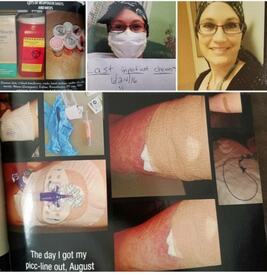|
You only have 2 choices, and choosing the wrong one could be devastating. These two choices can be life-changing, life-altering.
“What are these two choices?” you may ask. As you’re sitting in the doctor’s waiting room, these two choices wander around in your head. The first choice is to go into the doctor’s office blindly, relying solely on your symptoms and blindly following the path that your doctor gives to you. The other choice is to go into the doctor's office with some insight, direction, and knowledge so that you can be your own advocate. How do you be your own advocate? Self-advocacy is looking out for yourself and respectfully standing up for your views, opinions,
1 Comment
All I heard over a 12 hour period was that I was pregnant and/or miscarrying across several floors--from the ER to Labor & Delivery to Telemetry--until they tried to send me home. The last remark I heard before an actual diagnosis was that I was having a heavy period. As I was hemorrhaging. We're talking two buckets full, nearly-passing-out, horror-movie stuff. This was not just a heavy period. Give me a break.
Repeatedly, I refused their explanations for my four-month-postpartum intermittent bleeding. Repeatedly, I refused to go home. I was NOT going to bleed to death in my bed. I knew something was wrong and that  I remember the day clearly. My head was still rapidly spinning. I had finished weekly chemotherapy after six and a half months and my picc-line (peripherally inserted central catheter) was about to be removed. The reality was, I was terrified of this change. A number of what-if's filled my mind and uncertainties quarantined my body. So soon? I wasn't ready for this, yet it was an oncology order. I had learned to adjust to this being in my arm; it had been part of my arm as I learned to deal with the pain and minimal use that seeing it off was too much to grasp. I needed a little more time! The thought of my cancer returning and having another one put in was horrid. The picc-line RN that put it Some are willing to talk about anxiety while others are not, remaining hidden beneath their fears and the torture of it. When my molar pregnancy disease progressed to aggressive malignant cancer choriocarcinoma, my anxiety was at its highest. A molar pregnancy is rare, and threatens the life of a child. In my case, this affected the twins I was expecting and in turn led to me getting cancer.
What is anxiety? Plainly put, it is stress, but it goes much deeper for many people; it can be internal fear, affecting everyday life, minute to minute, hour to hour. Typical signs are irregular heart palpitations, It's not everyday you get to stay in the hospital, and most hospitals are far from luxurious. However everyone at some point in their lifetime spends at least one visit in the hospital, whether it be surgery, illness, or cancer treatment. Let's face it-hospital time is boring. Time seems to move very slowly. What are some tips to help the time pass?
I have done my share of time in the hospital after being diagnosed with placental cancer, choriocarcinoma, |
Categories
All
|

